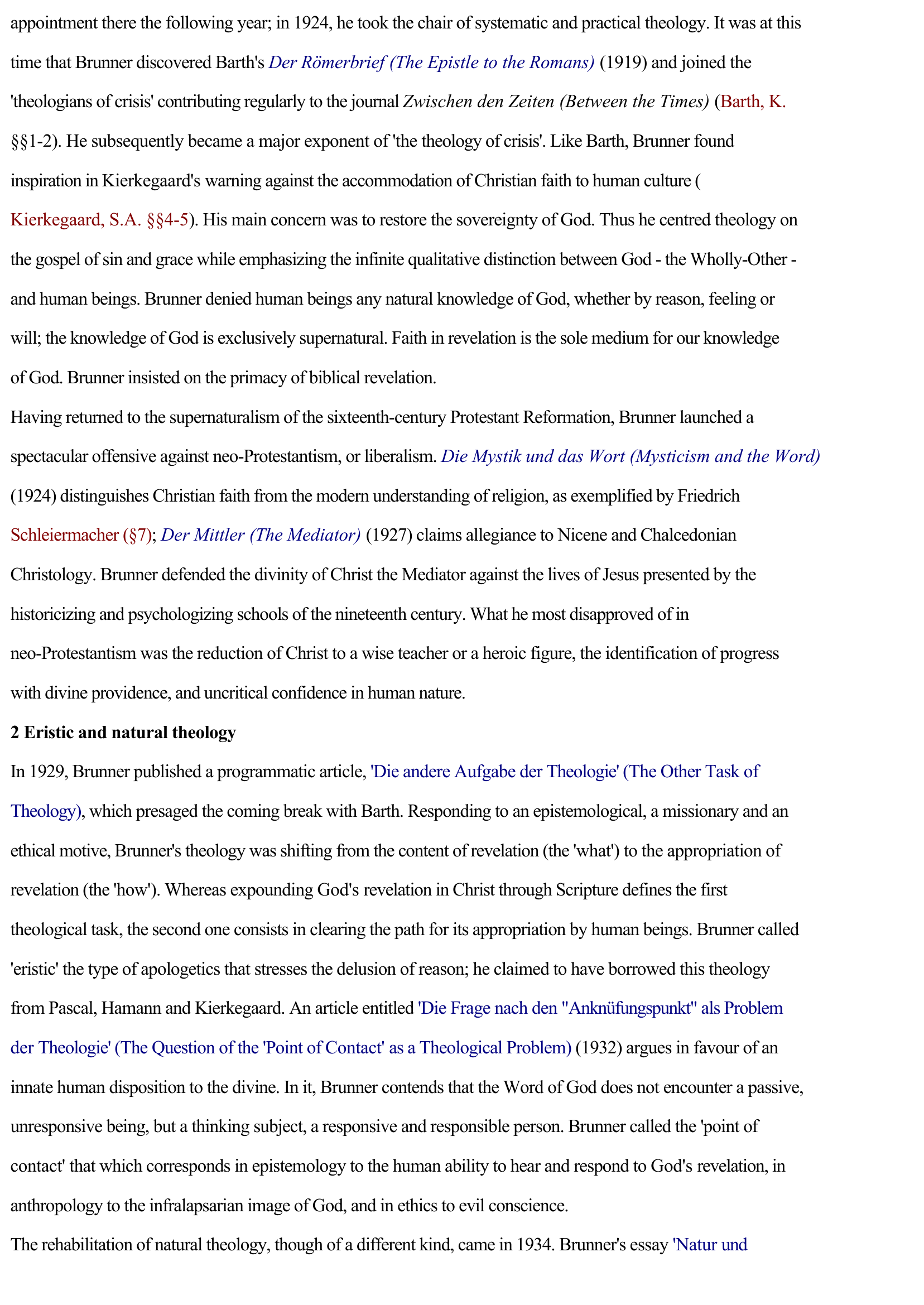Brunner, Emil
Publié le 22/02/2012
Extrait du document
«
appointment there the following year; in 1924, he took the chair of systematic and practical theology.
It was at this
time that Brunner discovered Barth's Der Römerbrief (The Epistle to the Romans) (1919) and joined the
'theologians of crisis' contributing regularly to the journal Zwischen den Zeiten (Between the Times) (Barth, K.
§§1-2).
He subsequently became a major exponent of 'the theology of crisis' .
Like Barth, Brunner found
inspiration in Kierkegaard's warning against the accommodation of Christian faith to human culture (
Kierkegaard, S.A.
§§4-5 ).
His main concern was to restore the sovereignty of God.
Thus he centred theology on
the gospel of sin and grace while emphasizing the infinite qualitative distinction between God - the Wholly-Other -
and human beings.
Brunner denied human beings any natural knowledge of God, whether by reason, feeling or
will; the knowledge of God is exclusively supernatural.
Faith in revelation is the sole medium for our knowledge
of God.
Brunner insisted on the primacy of biblical revelation.
Having returned to the supernaturalism of the sixteenth-century Protestant Reformation, Brunner launched a
spectacular offensive against neo-Protestantism, or liberalism.
Die Mystik und das Wort (Mysticism and the Word)
(1924) distinguishes Christian faith from the modern understanding of religion, as exemplified by Friedrich
Schleiermacher (§7) ; Der Mittler (The Mediator) (1927) claims allegiance to Nicene and Chalcedonian
Christology.
Brunner defended the divinity of Christ the Mediator against the lives of Jesus presented by the
historicizing and psychologizing schools of the nineteenth century.
What he most disapproved of in
neo-Protestantism was the reduction of Christ to a wise teacher or a heroic figure, the identification of progress
with divine providence, and uncritical confidence in human nature.
2 Eristic and natural theology
In 1929, Brunner published a programmatic article, 'Die andere Aufgabe der Theologie' (The Other Task of
Theology) , which presaged the coming break with Barth.
Responding to an epistemological, a missionary and an
ethical motive, Brunner's theology was shifting from the content of revelation (the 'what' ) to the appropriation of
revelation (the 'how' ).
Whereas expounding God's revelation in Christ through Scripture defines the first
theological task, the second one consists in clearing the path for its appropriation by human beings.
Brunner called
'eristic' the type of apologetics that stresses the delusion of reason; he claimed to have borrowed this theology
from Pascal, Hamann and Kierkegaard.
An article entitled 'Die Frage nach den " Anknüfungspunkt " als Problem
der Theologie' (The Question of the 'Point of Contact' as a Theological Problem) (1932) argues in favour of an
innate human disposition to the divine.
In it, Brunner contends that the Word of God does not encounter a passive,
unresponsive being, but a thinking subject, a responsive and responsible person.
Brunner called the 'point of
contact' that which corresponds in epistemology to the human ability to hear and respond to God's revelation, in
anthropology to the infralapsarian image of God, and in ethics to evil conscience.
The rehabilitation of natural theology, though of a different kind, came in 1934.
Brunner's essay 'Natur und.
»
↓↓↓ APERÇU DU DOCUMENT ↓↓↓
Liens utiles
- AMI HEIN (L’) Emil Strauss (résumé & analyse)
- CABARETIER DE L'ANGE (Le) (résumé & analyse) d’Emil Strauss
- ÉROS ET ÉRIS. (résumé) Emil Zilliacus
- RÉALISATION DE L’IMMUNITÉ (De la) contre la diphtérie et le tétanos chez les animaux Emil von Behring
- Kraepelin, Emil - psychologie & psychanalyse.


